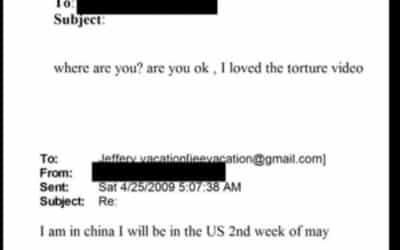The American republic, with its revolutionary constitutional premises, ended on September 11. September 11, 1941, that is. This was the date of the groundbreaking of the Department of War’s new headquarters: the Pentagon.
In a recent article, Jacob Hornberger regrets the creation of the American national security state. My one criticism of his article relates to this quotation: “When the Constitution was ratified, it brought into existence a limited-government republic. That meant a government whose powers were very limited — limited, that is, to those powers enumerated in the Constitution itself. After World War II, that all changed.”
I would argue that the change occurred just before the war, and that the war itself represents the flowering of the new America. Many Americans are desperate to hold onto the myth of national greatness proffered by the narrative of WWII. They are convinced that the threat posed by the evil Nazis and Japan demanded a necessary use of force to preserve freedom and democracy. They identify the war’s end as the beginning of the problem by invoking the American historical tradition of wars ending with demobilization and a reversal of war policies. I don’t think one can characterize the problem of the modern national security state as one having to do with a failure to demobilize.
It’s true that WWII is the unassailable, ultimate third rail of American politics. You can’t debate it publicly. I would understand why a libertarian might want to attack the problem of the national security state without having to suffer the plunge into irrelevancy that inevitably follows a sincere effort to critique WWII. However, I don’t think the national security state can ever be effectively critiqued until the myth of WWII is sufficiently challenged. WWII is the ultima ratio of the national security state.
Let me point out a date on the timeline. December 7, 1941. That’s when Pearl Harbor was attacked. That’s the date when WWII began for America, because the aggressive Japanese couldn’t just leave peaceful innocent America alone. America wanted to mind its own business, but Japan in its fanaticism wouldn’t let it. After Pearl Harbor, overnight, the strongly anti-interventionist America turned on a dime and plunged enthusiastically into war.
Odd, then, that the Pentagon’s groundbreaking occurred many weeks earlier. Odd that the project which would produce the bomb that dropped on Hiroshima began on 9 October, 1941. Odd that the draft began on September 16, 1940. And it’s especially odd that America began to provide strong material support for the Chinese military while simultaneously cutting Japan off from needed military supplies, all in the year prior to Pearl Harbor.
Japan tried to negotiate peace terms with the US, which centered around what would happen to China. The US wanted Japan to vacate their imperial holdings in China completely, but Japan had just spent about 15 years fighting a brutal war there to advance their interests, and was unwilling to give up what they had sacrificed so much to gain.
For context, 1935 was just 30 years after the United States’s own bloody war of colonial conquest in the Philippines (200,000 dead). In the 18th and 19th centuries, the British, Dutch, French, Russians, and Spanish had all operated brutal colonial empires in the East Asian region. From the opium wars onward through the boxer rebellion and other wars, dozens of millions of Chinese died. Japan itself, desperate to be left alone, was forced into the international stage by American gunboats less than 100 years before WWII. Its early colonial and great power ventures in Korea and against Russia were under the tutelage of America and England. By the 1930s, the brutal USSR was invading China from the North, and civil war there had claimed the lives of millions before Japan became involved.
There’s no doubt that Japan had a brutal colonial empire, and their society operated according to vastly different values than those in the West (though, in my opinion these values are misunderstood, caricatured, and subject to racism and war propaganda). However, in context Japan’s behavior completely conformed to reason. Japan was willing to turn away from their war in Mainland China (excepting their long-held colony in Manchuria), and concede away the possibility of hegemony over Southeast Asia in exchange for peace with the West. America demanded total acquiescence to Western hegemony. America wanted a Japan which was isolated to its homeland, and irrelevant as a great power. In a world still under the grips of Western colonialism, how could a traditional state which as of yet had defied Western power rationally accept this outcome?
America’s interest in East Asia wasn’t tied to democracy, but rather to the fact that the Chinese nationalist government had strong ties to certain American oligarchs. Chiang-Kai Shek was essentially a puppet of this network.
Japan’s last efforts at peace were rebuffed. The American response, the Hull note, was essentially a declaration of war. America demanded that Japan neuter its own power in favor of Western power, and upheld this demand as the only circumstance by which war could be avoided. Though American government officials might have hoped Japan would acquiesce to avoid war, they had to suspect that Japan would almost certainly go to war with America – perhaps in the Philippines.
While Japan did initiate formal violence against America – their Pearl Harbor attack was followed minutes later by a declaration of war – Japanese war plans discovered after the war prove that no serious plans existed to invade America. The ships in Pearl Harbor were seen as a force capable of projecting power into East Asia – which was their explicit purpose – and the attack was essentially defensive.
In Europe, the war’s official starting point is marked by the German invasion of Poland in 1939. While I haven’t yet been able to confirm the notion, there seems to be a plausible case to be made that any efforts to avoid this invasion were scuppered by FDR himself (the source in question needs further verification). This idea proposes that FDR threatened Polish leadership with a loss of support if they negotiated with Hitler, and also pressured England to maintain what is considered to have been a foolish war guarantee.
I may be a revisionist, but I think strong evidence exists that Germany would have greatly preferred that their war would not have expanded beyond Eastern Europe. I think irrefutable evidence exists that Japan would have preferred that their war would not have expanded beyond China, and moreover that the war in China was winding down. It’s true that even in such a limited scenario, millions would have died. However, the global conflagration that did occur took between 50-80 million lives worldwide. This doesn’t even account for the approximately 50 million killed by Mao, the 20+ million killed in the Gulag archipelago, or the up to 20 million killed by the United States during the post war era (of course, counter-factually we can speculate about the Nazi-Fascist war of 1961, for example, but the point being that the post-war world has been no paradise). We have to ask, what made WWII global?
Murray Rothbard advances a fairly sensational, but plausible, theory about the deep politics leading up to war. He believes that politics in America in the early 20th century had been a competition between those connected into the financial and political networks affiliated with the Rockefeller family, and those associated with JP Morgan. He proposes that the Rockefellers, with important interests in East Asia, and ties to Chiang Kai-Shek, had been advocating war with Japan. The Morgans, with ties to London, wanted to maintain the preeminence and power prerogatives of the British Empire in Europe. Moreover, the British government itself aggressively lobbied for American involvement in the war. The two war aims seemed irreconcilable, especially because of American popular antiwar sentiment. Rothbard perceives that an alliance between the two factions of American deep politics was the result of an agreement to make war in both Europe and the Pacific.
Consider then, the logic of this agreement in light of the post-war environment. America would build a military might capable of acting as had the British Empire in the world, in defense of London’s financial interests. America would keep potential European hegemons down, and protect freedom of the seas. Meanwhile, America would build a large military expeditionary force capable of acting as a hegemonic power in East Asia, to protect American business interests there.
American deep politics would have been formulating these plans starting by 1938 at the latest. Consequently, the run up to war would have begun by 1940, which is what happened. The war may have begun a bit before the war machine was ready, thanks to Japanese bravado, yet the Pearl Harbor attack represented the political means to overcome the war’s greatest obstacle: the will of the American people.
Consider also the context in America for the war: the ongoing “New Deal”. The New Deal was not an economics program (it completely failed to help the economy). It was a political program. The New Deal represented government hand outs to connected industries, and also to factions which constituted a permanent electoral coalition. Temporary and wasteful make-work programs would pop up just before elections. The war itself was a continuation of the New Deal, which had never ended. During his 1944 state of the union address, Roosevelt proposed a “second bill of rights”. He feared that once soldiers returned from war, there would be a permanent economic collapse. It’s as if the war was just another spoke, among dozens, of the New Deal.
I would contend and advance the theory that WWII itself represents the apotheosis of the trend of corporate corruption of American politics. The tremendous wealth produced by industrialization provided for the wasteful practice of wealth redistribution for political purposes. This is a tactic first employed by Bismarck to consolidate the German Empire through national welfare programs. In America, fierce competition made wealth preservation very difficult. Large companies were frequently out-competed. Those with wealth eventually created the Progressive movement in order to use government regulation to protect their wealth from competition. This phenomenon brought business competitors into politics. FDR sought to stabilize the ruthless politics that followed by employing welfare politics and alliance building. His second bill of rights would have hardly been distinguishable from the fascist politics in Europe. American Progressive politics lament the restrictions of the Constitution and are a de facto rejection of the founding philosophy of America.
When you examine the financial world order and international systems that emerged in the post-war order, you can see that WWII was the internationalization of New Deal and Progressive politics.
With that in mind, I would content that WWII was not the product of “German and Japanese” aggression, but rather a deliberate creation of the true Axis of Evil: Soviet expansionist communism, Anglo imperialist death throes, and American New Deal politics. That is to say, American politics needed to build large armies, and needed excuses to use them. That is the cause of WWII; it is the war’s lynchpin as a global conflict.
Until the national security state is viewed in that light, its true nature can’t be addressed.






























